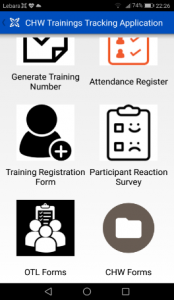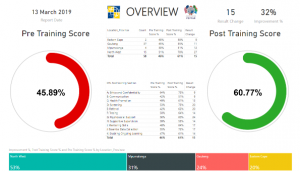In South Africa, the International Training and Education Center for Health (I-TECH) has begun facilitating an in-service skills development training program for community health workers (CHWs) and their supervisors in their roles on the Ward-Based Primary Health Care Outreach Team (WBPHCOT). To maximize the impact of this training, I-TECH is working with two PEPFAR District Support Partners across seven of South Africa’s nine provinces to reach an estimated 20,000 CHWS, which is approximately half of the country’s CHW workforce. Training began in February 2019 and will continue through September 2019.
The WBPHCOT In-Service Skills Development Package aims to strengthen the capacity of CHWs to provide high-quality health services in the community. The program emphasizes development of core, cross-cutting service delivery skills, including communication, screening, psychosocial support, ethics, and confidentiality that enable CHWs and their supervisors, known as Outreach Team Leaders (OTLs), to effectively carry out their work.
During training, CHWs and OTLs build their skills in both classroom and on-the-job settings using group discussions, case presentations, scenario-based role play, small group activities, and interactive presentations. Priority health conditions and related clinical topics are included, and the realistic scenarios cover all components of the CHW scope of work.

Leveraging Technology to Improve Training
All training data collected for the skills development program will be captured via a mobile application and stored using the CommCare platform, a mobile data collection system developed by Dimagi. The app allows I-TECH access to real-time data, which can inform targeted measures to ensure that all CHWs are receiving high-quality trainings.
To tailor the program to the needs and realities of the field, I-TECH has implemented a blended tablet and paper-based data collection approach.
“There is such a large number of CHW trainees in the field that using this blended approach allows the OTLs to dedicate their time to training CHWs rather than focus on paperwork,” says Ilyse Jacobson, I-TECH South Africa Technical Director of Programs. “This flexibility allows for more in-depth and efficient training.”

Due to its role as the sole repository for all training-related data, the CommCare database will also generate reports linked to an interactive stakeholder dashboard.
“The dashboard not only brings I-TECH’s data visualization and dissemination approach into the 21st century,” says Jacobson, “it allows project stakeholders access to the data that helps with decision-making both in and outside of this program.”
The design of the Stakeholder Dashboard allows donors, implementing partners, and the National Department of Health to track current progress against training targets on a weekly basis.